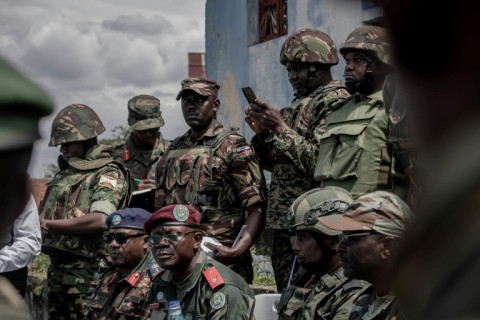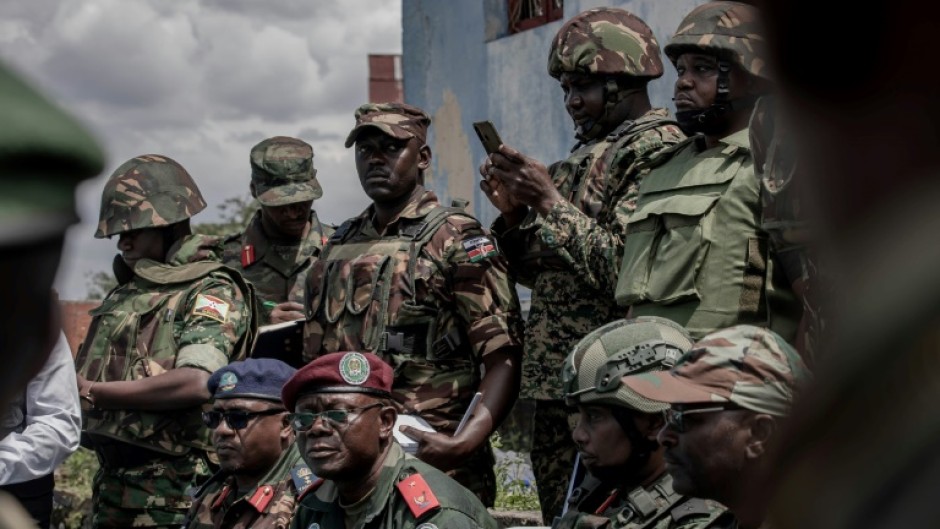
East African leaders were holding a regional summit in Burundi on Saturday to discuss ways of calming the raging conflict in eastern DR Congo.
The talks are hosted by the seven-nation East Africa Community, which is leading mediation efforts to end the fighting in the restive east of the giant central African nation.
A resurgent rebel group known as the M23 has taken swathes of land in the mineral-rich region and is still advancing despite a peace roadmap reached in the Angolan capital in July last year.
Among those at the meeting in the lakeside economic hub of Bujumbura are Congolese President Felix Tshisekedi and President Paul Kagame of Rwanda, which is accused of backing M23 in a conflict that has exacerbated regional tensions.
EAC chair and Burundi President Evariste Ndayishimiye said on Twitter the meeting would evaluate the situation with "a view of coming up with decisions that will ameliorate the security situation & facilitate the restoration of peace and security in eastern DRC".
The Congolese presidency said the Luanda roadmap demanded the "effective and definitive withdrawal" of M23 and Rwanda Defence Force troops from occupied zones before January 15.
"The terrorist troops from M23 have never left these zones, on the contrary the M23 and its allies have expanded their areas of occupation," it said on Facebook.
Kagame is on his first visit to Burundi since 2013, with relations long frayed between the Great Lakes neighbours.
- 'Brutal atrocities' -
The EAC meeting is taking place shortly after a visit by Pope Francis to Kinshasa, where he met victims of the conflict and condemned the "inhumane violence" and "brutal atrocities" taking place.
Militias have plagued the mineral-rich region for decades, many of them a legacy of regional wars that flared during the 1990s and the early 2000s.
Since November 2021, the M23 has seized chunks of territory in the east and come within miles (kilometres) of its main commercial hub Goma.
The EAC decided to create a military force to pacify eastern Congo last year, with the first troops arriving in Goma in November.
The DRC's accusations that Rwanda is backing the M23 has been supported by UN experts, the United States and other Western countries but Kigali denies the charge.
Last week, Qatar had planned to host a meeting between Tshisekedi and Kagame, but diplomats said the Congolese leader refused to attend.
Tensions between the two countries were inflamed last week when Rwandan forces opened fire at a Congolese fighter jet they said had violated Rwandan airspace.
Kinshasa described it as an attack that amounted to "an act of war".
The summit also signals a possible rapprochement between Burundi and Rwanda, with their two leaders greeting each other warmly in Bujumbura.
The two tiny countries have long had tempestuous relations, each accusing the other of interfering in their internal affairs.
In 2020, Kagame urged the then newly-elected Ndayishimiye to reset diplomatic ties but his overture was rejected as "hypocritical".
Burundi has accused Rwanda of harbouring those behind a failed 2015 coup that plunged the country into violent chaos.
In a statement ahead of the EAC summit, Kenya's President William Ruto said the international community needed to act to protect Congo's resources, a key source of the myriad conflicts.
"The moment is long overdue for the international community to most vigilantly audit industrial supply chains and make sure that global production and consumption honour Congolese resource sovereignty and do not profit out of conflict and human suffering," he said.
The DRC is awash with minerals and precious stones, from gold, diamonds and coltan to tin, copper and cobalt. But the decades of war and chronic mismanagement means that little of the enormous wealth trickles down to the population of some 100 million people.

